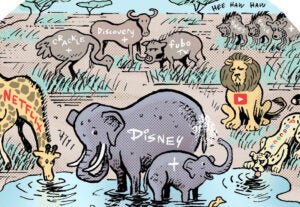 “Data Driven Thinking” is written by members of the media community and containing fresh ideas on the digital revolution in media.
“Data Driven Thinking” is written by members of the media community and containing fresh ideas on the digital revolution in media.
Today’s column is written by Nikhil Sethi, who is co-founder/CEO Adaptly.
In the world of social media and social networks, native advertising models are taking over. Anything I can do as a consumer – tweet, like, share, stumble, watch a video, comment – is reflected in the possible paid media opportunities. If I as a user can tweet, the paid media opportunity is a promoted tweet. If I can like something or have a conversation on Facebook, the paid media opportunities lie within sponsored stories and page post ads. The traditional display advertising approach of using real-estate to push content into users’ view is starting to erode very quickly and the use of data in marketing starts to shift from, “Give me a vacuum and I’ll go sell it” to “Let’s figure out which vacuum to actually build.”
The recent news that GM is claiming Facebook ads are ineffective actually makes a lot of sense from the traditional point of view. Of course Facebook is unable to compete – if the measure of effectiveness is a legacy attribution model. We’re comparing two fundamentally different approaches to each other. Intent-based advertising models are akin to the demand harvesting approach, which Google has conditioned the marketer for several years now. There are no well-respected models for a demand generation approach in the digital landscape today. Radio, print and television have adopted metrics that represent top of the funnel campaign goals but these don’t translate gracefully into the digital space.
Traditional methods for measuring the quality of ads in search and display channels have focused on contextual relevance and click behavior. These methods focus on the first order impact of an ad unit and the site it appears on. But the powerful effect of the democratized social web is that a single voice can change perception around a brand or other social object extremely quickly and virally. We should be measuring the impact of a piece of social content not by how many people have clicked on it, but by how it organically travels throughout networks. Because of the way content moves within social channels, we should consider determining ad quality in the format of percent penetration (organic reach) within a channel. High penetration shows that a given audience resonates with a piece of content, whereas low penetration indicates either a poorly acquired audience, poor content being generated or weak potential for sharing.
Social platforms are having an identity crisis. Facebook looks, feels, and smells like a digital platform, but it isn’t. The cookie-tracking model was version 1.0 of identity on the Internet and, simply put, Facebook is the next generation version of identity.
The growing expenditure on the earned and owned content side of social advertising is part of this new model. Online advertising cannot be solely focused on demand harvesting or responding to the last keyword used or page viewed, but should also be about generating demand, pushing people towards fresh new content and ideas and spreading them further with paid media.
In a social world where everyone’s voice is equally loud, paid media is only as good as the content behind it, and content is only as good as how many people it reaches. The fundamental measure of effectiveness in advertising has evolved. We need new models for the more social web.
Follow Nikhil Sethi (@nsethi), Adaptly (@adaptly) and AdExchanger.com (@adexchanger) on Twitter.











